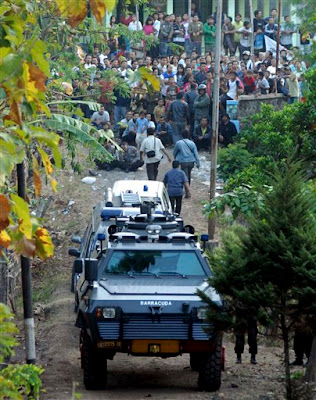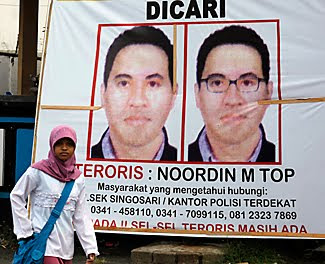
Police officers pull out after a raid on a suspected terrorist hideout in Solo, Central Java, Indonesia, Thursday, Sept. 17, 2009. Police hunting for suspects in Jakarta hotel bombings raided a hideout in central Indonesia, sparking gunfire and an explosion Thursday that left four suspected militants dead, officials said. Three alleged terrorists also were captured.

Police officers load the coffin of one of the four terror suspects killed in a police raid on a hideout into an airplane to be transported to the main police hospital in Jakarta at Adisumarmo Airport in Solo, Central Java, Indonesia, Thursday, Sept. 17, 2009. Gunfire and an explosion killed four suspected militants and wounded a police officer Thursday when authorities raided the alleged hideout in central Indonesia while hunting for suspects in the Jakarta hotel bombings, an official said.

Indonesian National Police Chief Gen. Bambang Hendarso Danuri shows the fingerprints taken from one of the bodies of the terror suspects killed in a police raid in Central Java, right, that match with those of Malaysian terror suspect Noordin Muhammed Top, lower left, during a press conference in Jakarta, Indonesia, Thursday, Sept. 17, 2009. The regional terrorism mastermind who eluded capture for nine years and is blamed for a string of deadly attacks in Indonesia, was killed during a raid in central Indonesia, the police chief said Thursday.

Police officers stand guard outside a suspected terrorist hideout after it was raided by anti-terror squad in Solo, Central Java, Indonesia, Thursday, Sept. 17, 2009. Gunfire and an explosion killed four suspected militants and wounded a police officer Thursday when authorities raided an alleged hideout in central Indonesia while hunting for suspects in Jakarta hotel bombings, an official said

A police officer stands guard outside a suspected terror hideout after it was raided by an anti terror squad in Solo, Central Java, Indonesia, Thursday, Sept. 17, 2009. Police hunting for suspects in the Jakarta hotel bombings raided the hideout in central Indonesia, sparking gunfire and an explosion Thursday that left four suspected militants dead, officials said. Three alleged terrorists also were captured.

UPDATES with confirmed death of militant, Noordin Muhammad Top; map locates Solo, Indonesia, where four were killed and three captured in an anti-terror raid

In this combination file photo released by the Indonesian National police, Malaysian terror suspect Noordin Muhammed Top is seen, more recently in photo at right. An Indonesian police chief said Thursday, Sept. 17, 2009, that Top, a regional terrorism mastermind who eluded capture for nine years and is blamed for a string of deadly attacks in Indonesia, was killed in a police raid on a terrorist hideout in Central Java.

A police armored car is seen parked as onlookers gather near the site of police raid on a suspected terrorist hideout in Solo, Central Java, Indonesia, Thursday, Sept. 17, 2009. Gunfire and an explosion killed four suspected militants and wounded a police officer Thursday when authorities raided an alleged hideout in central Indonesia while hunting for suspects in Jakarta hotel bombings, an official said.

Members of Indonesian police anti-terror squad carry a box of ammunition as they walk from the site of police raid on a suspected terrorist hideout in Solo, Central Java, Indonesia, Thursday, Sept. 17, 2009. Gunfire and an explosion killed four suspected militants and wounded a police officer Thursday when authorities raided an alleged hideout in central Indonesia while hunting for suspects in Jakarta hotel bombings, an official said.

Indonesian National Police Chief Gen. Bambang Hendarso Danuri shows the fingerprints taken from one of the bodies of the terror suspects killed in a police raid in Central Java, right, that match with those of Malaysian terror suspect Noordin Muhammed Top, lower left, during a press conference in Jakarta, Indonesia, Thursday, Sept. 17, 2009. The regional terrorism mastermind who eluded capture for nine years and is blamed for a string of deadly attacks in Indonesia, was killed during a raid in central Indonesia, the police chief said Thursday.

Security forces surrounded the Java house overnight before a blast was heard at daybreak

A wanted posted for Noordin Muhammad Top, Indonesia’s most wanted Islamist militant.


A woman walks past a giant wanted poster of leading Islamic militant Noordin Mohammad Top in Malang, East Java province in this August 8 file photo.
The shooting of Indonesia's most wanted militant was a step forward in the fight against regional extremism, Australia's Prime Minister Kevin Rudd said on Friday, while cautioning Jakarta against relaxing the struggle.
Authorities in Indonesia have confirmed that one of four men killed during a raid on a house in the city of Solo, on the country's main island Java, was Noordin Mohammad Top, considered to be the leading Islamic terrorist in Southeast Asia.
Southeast Asia's battle with terrorism may not be over, despite today's death of one of Indonesia's most-wanted men.
Indonesian police said on Thursday they had killed Noordin Mohammed Top, leader of a splinter group of the Jemaah Islamiah (JI) militant network, in an early morning gun battle in Solo, Central Java. Three of his accomplices also died.
Mr. Noordin, a Malaysian national, was thought to have been the mastermind behind a string of bombings and terrorist attacks since 2002 that have left hundreds dead, both foreigners and locals in Indonesia, the world's most populous Muslim country.
JI has at times had links to Al Qaeda, the militant Islamist network responsible for the 9/11 attacks in the United States, and to other militant groups in the region. Indonesian police, assisted by US and Australian authorities, have been under pressure to apprehend Mr. Noordin since a July 17 bomb attack on the JW Marriott and Ritz-Carlton hotels in Jakarta, in which nine people, including suicide bombers, were killed and 53 wounded.
Militancy still a threat
Some 88 percent of Indonesia's 230 million people proclaim Islam as their faith. Analysts estimate only a small percentage of Indonesian Muslims subscribe to militant Islamism.
But even with Mr. Noordin's death, Indonesia still faces challenges in dealing with militant groups, as Noordin may have passed on his skills to a new generation.
A planner of the July bombings, whose name was Ibrohim, was recruited to Noordin's inner circle in 2005. The suicide bombers of the JW Marriott and Ritz-Carlton hotels, were 18 and 28 years old, respectively. Noordin has been moving across Java for the past seven years, analysts believe, and may have had contact with a wide range of potential radicals.
The July attacks also showed JI's ability to adapt and evolve. Police investigations show that JI had been able to penetrate hotel security and place operatives within the ranks of employees. "It's a new game," says one Western intelligence official, "they've proven they can learn and adjust their methods."
The July bomb attacks in Jakarta ended a four-year lull in suicide bomb attacks in Indonesia. The militants had also planned to assassinate Indonesia's President Susilo Bambang Yudhoyono at his home with a suicide bomb.
Noordin, a recruiter and strategist for the JI network, fled with his accomplice Azahari to Indonesia from Malaysia following a Malaysian crackdown on militants after Sept. 11, 2001. Azahari was killed in a shootout with police in November 2005, but Noordin escaped.
Around 2003, Noordin's disagreement with other members of the JI network over the use of violence, even if it killed other Muslims, pushed him to form a violent splinter group, Tanzim Qaedat al-Jihad.
JI's ideological roots lie in an older movement, Darul Islam, which, in the 1940s and 1950s, sought to establish an Islamic state in Indonesia. An Islamic caliphate across Southeast Asia, including Singapore, Malaysia, and the Philippines, remains JI's ultimate goal.
People who know Nordin Top.
People who knew him and people who have studied his activities said Thursday that Mr. Noordin had a quiet magnetism that drew sympathizers to protect him, new recruits to join his splinter group and at least three women to marry and start families with him, giving him both cover and shelter.
“He was a quiet person, didn’t talk much, very pious,” said an Islamic clergyman, Abu Wildan, who knew him between 1993 and 2002 when he was a student and then the headmaster at Lukmanul Hakiem, an Islamic boarding school in Malaysia, where he was born.
“He prayed five times a day and was keen to look after and defend the Muslims’ rights,” Mr. Wildan said in a telephone interview. Mr. Noordin, who graduated from the University of Technology in Malaysia in 1991, taught computers, sociology and the Malay language at the boarding school, he said.
Mr. Noordin was also a networker, Mr. Wildan said, visiting friends who were sick and consulting with fellow teachers before making decisions at the boarding school.By this time he seemed to have matured into a more focused and ambitious man, according to Nasir Abas, a former Islamist leader who defected to the government in 2003 and who was for a time Mr. Noordin’s commander.
“He is very well-organized,” Mr. Abas said in a telephone interview. “He is very charismatic. He is articulate, he is very good in influencing people to join his cause, giving encouragement and motivation.
“He could preach a very radical version of Islam but could present it in a very, very simple way to attract students whom he managed to convince,” Mr. Gunaratna said in an interview.
Mr. Noordin’s death is a major victory for security forces, he said, but it will not mean an end to violence. “He leaves behind a significant network that will continue the fight.”
------------
-------------






0 comments:
Post a Comment